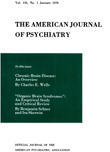Identification of a subgroup of tardive dyskinesia patients by pharmacologic probes
Abstract
Some patients with tardive dyskinesia fit the cholinergic-dopaminergic imbalance theory, but some do not. In an attempt to study his heterogeneity further, the authors measured the responses of 10 patients with tardive dyskinesia to intravenous challenge doses of drugs that facilitate or inhibit acetylcholine transmission (physostigmine or benztropine, respectively). They then measured the response of these patients to an open outpatient deanol trial. They found that the responses of half of the patients followed the classic theory, 2 responded paradoxically, and 3 responsed inconsistently. They suggest that there is a subgroup of tardive dyskinesia patients who fit the theory but that more research is needed to identify the subgroups who do not.
Access content
To read the fulltext, please use one of the options below to sign in or purchase access.- Personal login
- Institutional Login
- Sign in via OpenAthens
- Register for access
-
Please login/register if you wish to pair your device and check access availability.
Not a subscriber?
PsychiatryOnline subscription options offer access to the DSM-5 library, books, journals, CME, and patient resources. This all-in-one virtual library provides psychiatrists and mental health professionals with key resources for diagnosis, treatment, research, and professional development.
Need more help? PsychiatryOnline Customer Service may be reached by emailing [email protected] or by calling 800-368-5777 (in the U.S.) or 703-907-7322 (outside the U.S.).



